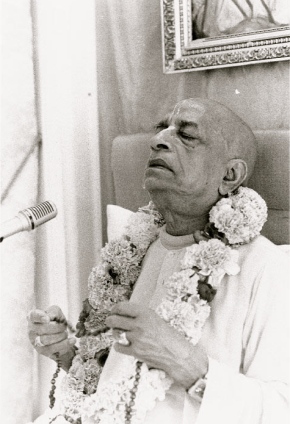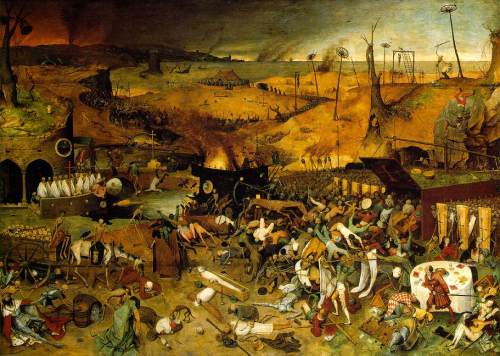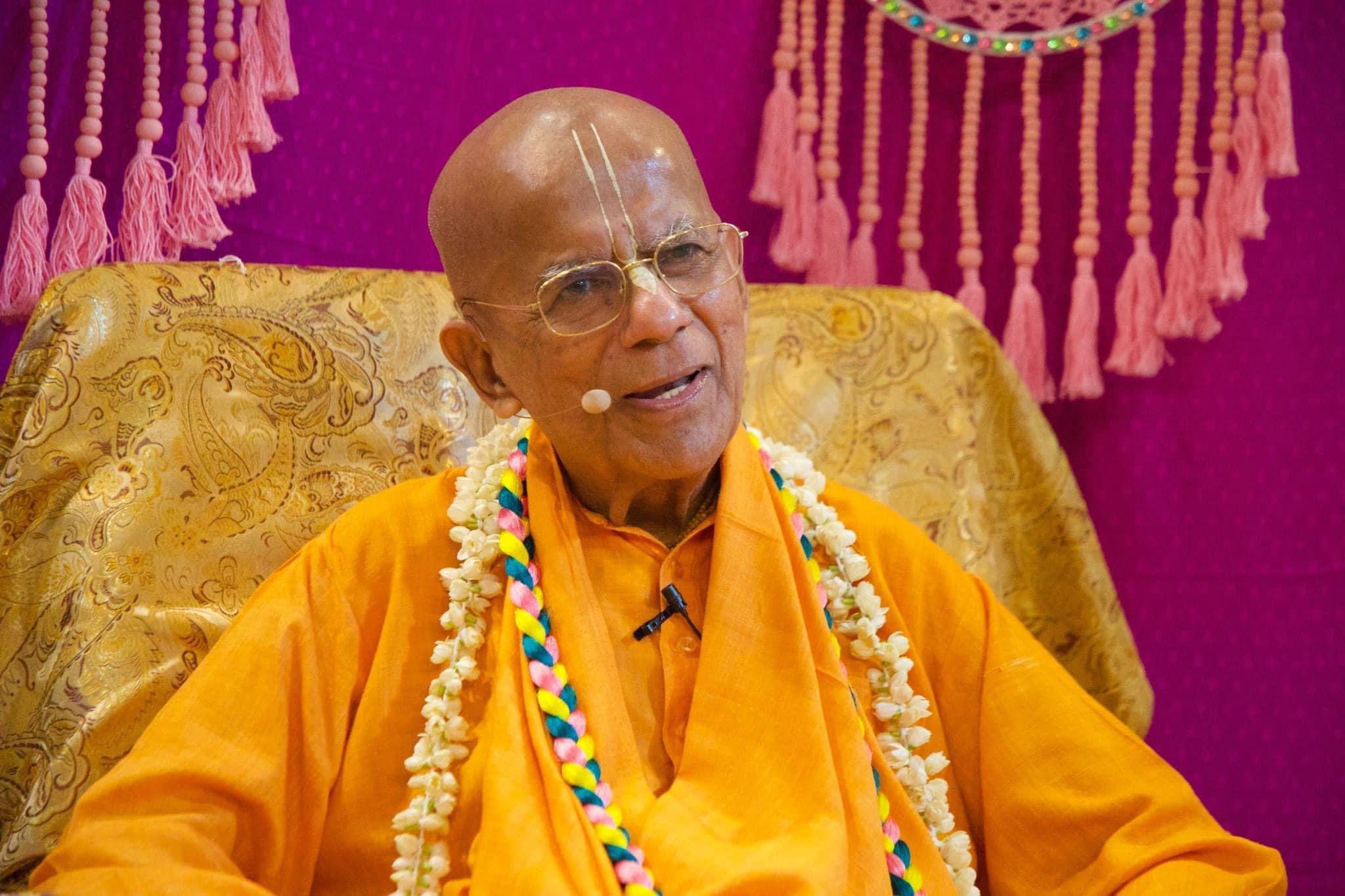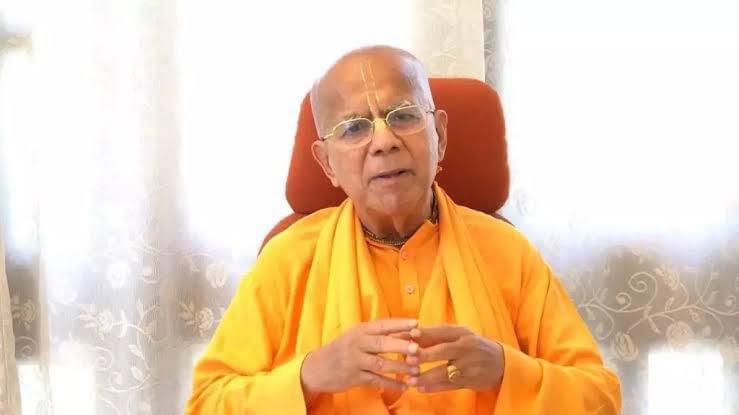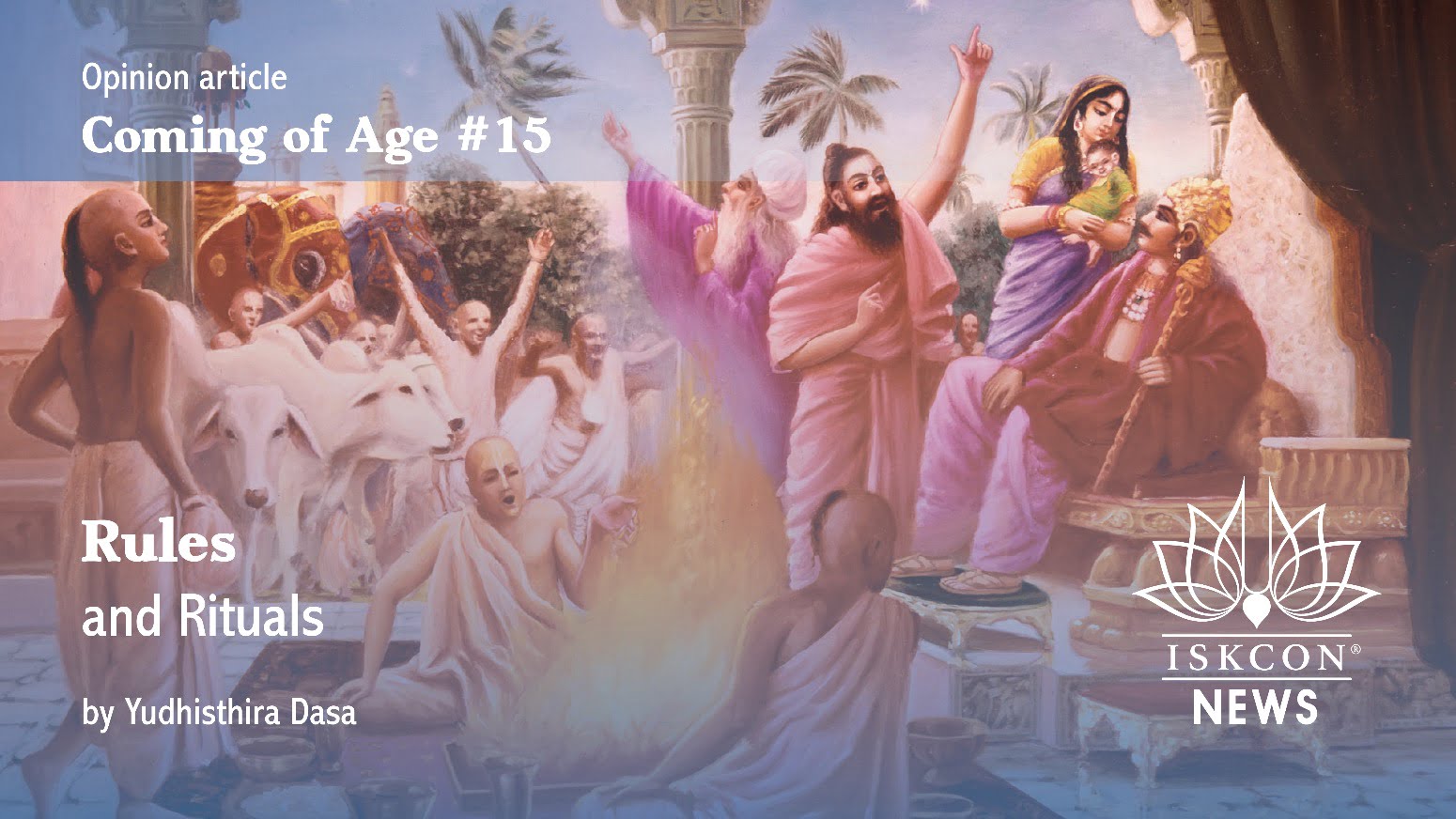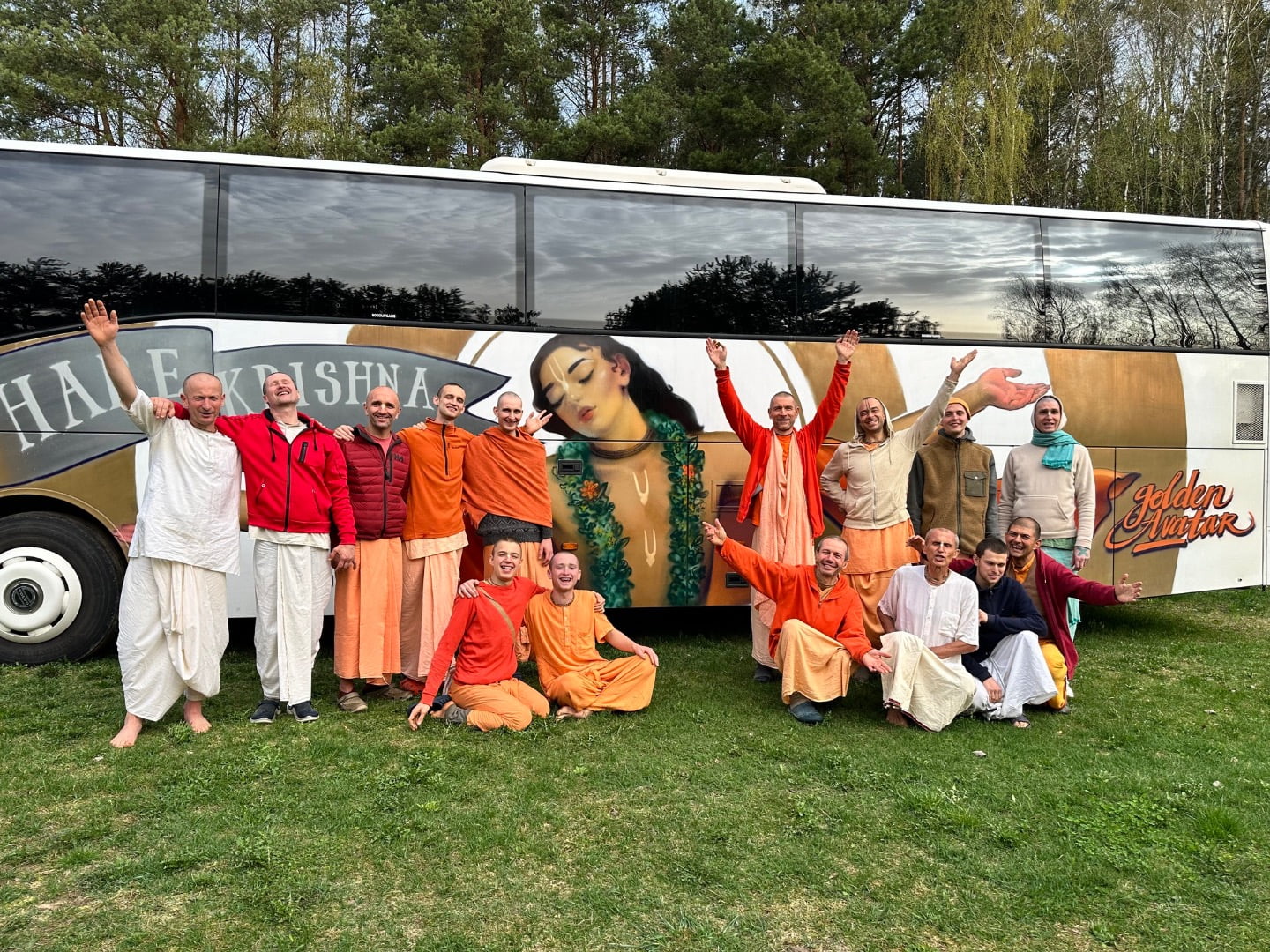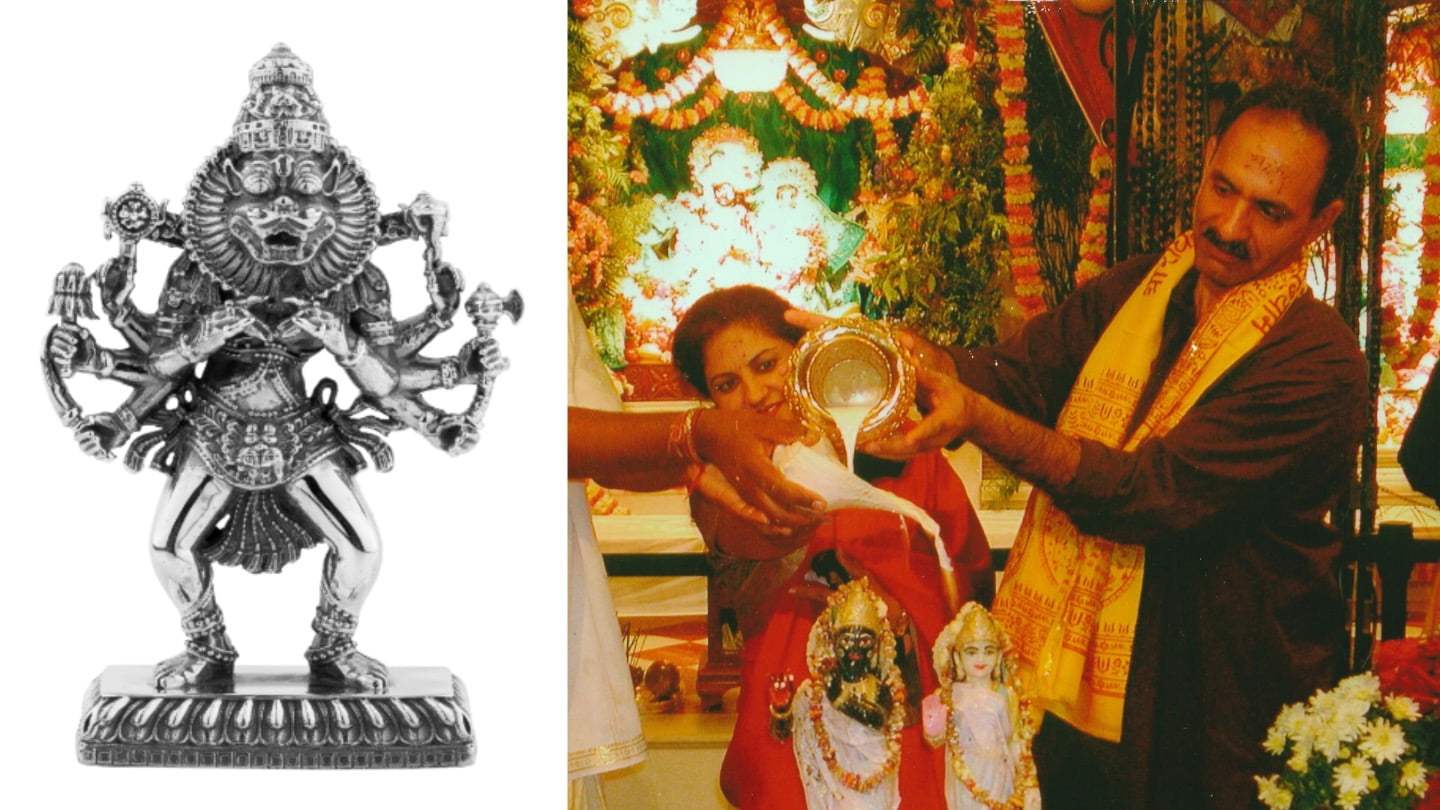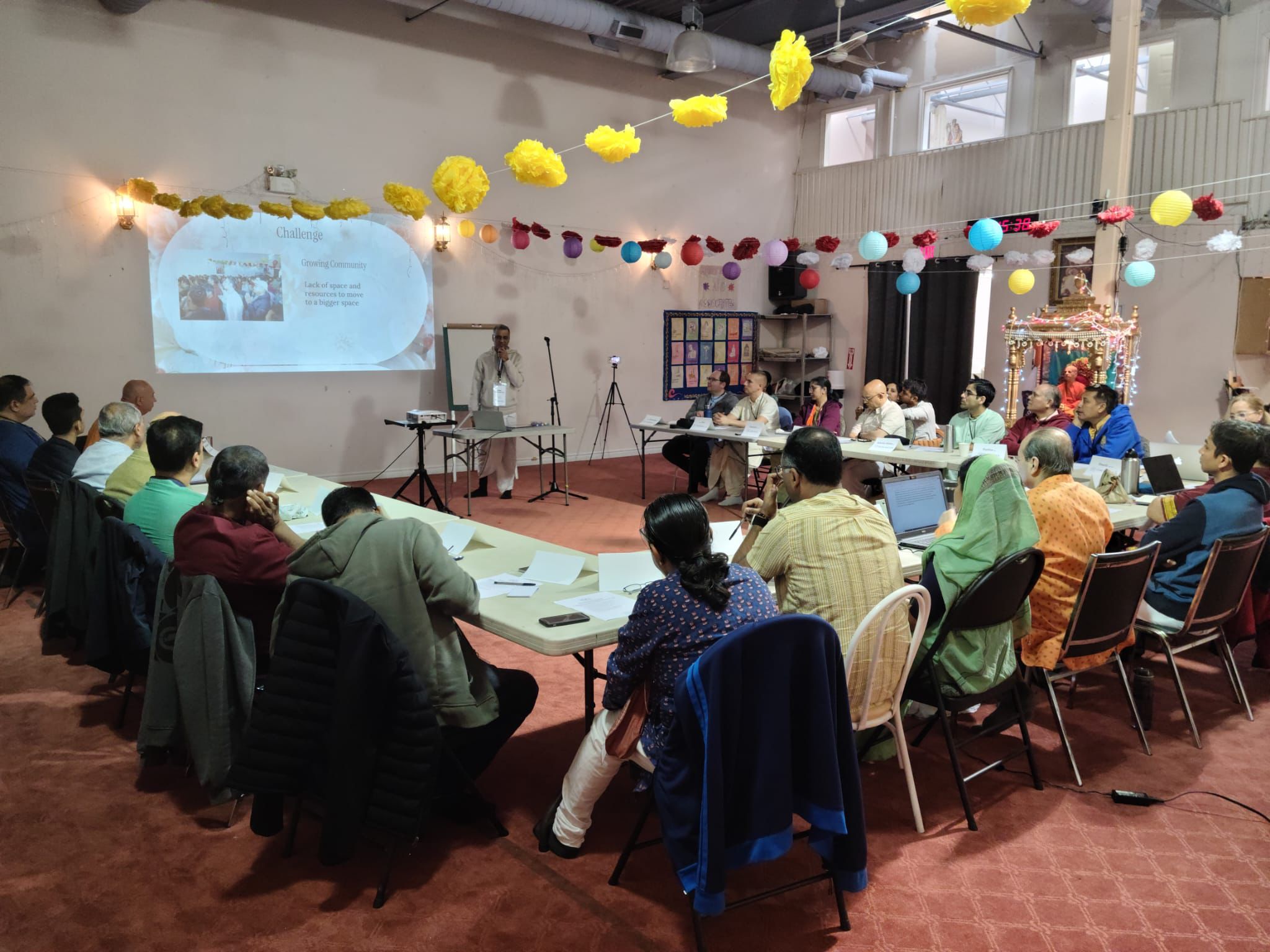The Soul of Compassion
By Ravindra Svarupa Dasa | Aug 15, 2009

It is December of 1936. Abhaya Charanaravinda Dasa, a forty-year-old pharmaceutical distributor then in Bombay on business, feels a sudden impulse to write a letter to his spiritual master, Srila Bhaktisiddhanta Sarasvati Thakura.
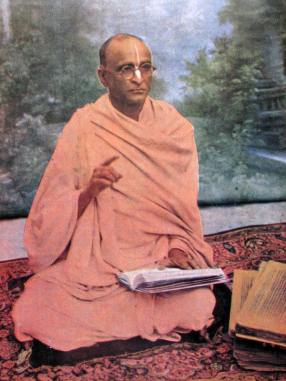
Srila Bhaktisiddhanta Sarasvati Thakura
It is December 9, 1968, thirty-two years later. The same disciple—now a renunciant and spiritual master himself—finds himself in the city of Los Angeles where he relates to a gathering of his own disciples the story of his 1936 letter. He is observing with them the “Disappearance Day” of his spiritual master.
“Swami—” A. C. Bhaktivedanta Swami
Abhaya Charanaravinda Bhaktivedanta Swami asks his disciples: “Who knew that I would come in America? Who knew that you American boys will come to me? These are all Krishna’s arrangement. We cannot understand how things are taking place.” He continues:
In Bombay, I was then doing some business. All of a sudden, perhaps on this date, sometimes between 9 or 10 December. At that time, Guru Maharaja was indisposed little, and he was staying at Jagannatha Puri, on the seashore. So I wrote him letter, “My dear master, your other disciples, brahmacaris, sannyasis, they are rendering you direct service. And I am a householder. I cannot live with you, I cannot serve you nicely. So I do not know. How can I serve you?” Simply an idea, I was thinking of serving him, “How can I serve him seriously?” So the reply was dated 13th December, 1936. In that letter he wrote, “My dear such and such, I am very glad to receive your letter. I think you should try to push our movement in English.” That was his writing. “And that will do good to you and to the people who will help you.” That was his instruction. And then in 1936, on the 31st December—that means just after writing this letter a fortnight before his departure—he passed away.
Some background: “Push our movement in English” was an expression immediately recognized among the followers of Srila Bhaktisiddhanta Sarasvati Thakura. It denoted his fervent desire for his disciples to propagate Krishna consciousness boldly in the countries of the West. He had urged this course upon his most competent leaders in his institution, who, as sannyasis or brahmacaris, were free to venture forth unfettered by familial and social bonds. These renunciants, under Srila Bhaktisiddhanta Sarasvati Thakura’s direction, had spread Lord Caitanya’s movement all over India, opening sixty-four temples. Now he wanted to expand outside of India. Yet his disciples had, so far, disappointed him.
Householders, with their domestic and social obligations, were not as available for widespread preaching. Abhaya Charanaravinda Dasa understood well the intensity of his guru’s desire to give others Krishna consciousness, and he keenly felt his own lack. So he had written: “I am bound by family obligations and cannot serve you like my renounced godbrothers; even so, is there any service I can render?” How astonishing, then, it must have been for Abhaya Charanaravinda Dasa to receive in answer the exact same instruction Srila Bhaktisiddhanta Sarasvati Thakura had imparted to his renounced leaders.
In Los Angeles in 1968, A. C. Bhaktivedanta Swami—at that time addressed as “Swamiji—”recounts to his small band of disciples: “I took that order of my spiritual master very seriously. But I did not think that I’ll have to do such and such thing. I was at that time a householder.” In other words, although he took the order to heart, he could not at first consider any practical plans. He was incapacitated: “at that time a householder.”
Swamiji continues: “But this is the arrangement of Krishna. If we strictly try to serve the spiritual master, his order, then Krishna will give us all facilities. That is the secret.” How did it happen that he came to America and American youth joined him? Here he answers the question. Even though the order of his guru seemed like “mission impossible,” (to expropriate the title of an old American TV series), Swamiji committed himself to it anyway: “Although there was no possibility. . . . I never thought . . . . But I took it little seriously by studying a commentary by Visvanatha Cakravarti Thakura on the Bhagavad-gita.” Explaining the “resolute determination” cited by Krishna (BG 2.41) as necessary for spiritual success, Visvanatha Cakravarti Thakura wrote:
The instructions of my spiritual master . . . are my only sadhana, my only sadhya, my only livelihood. I am incapable of giving up these instructions either in the stage of practice or in the stage of perfection. They alone are my object of desire and my only responsibility. Besides them I can desire no other responsibility, not even in my dreams. It is all the same to me whether I feel happy or unhappy, or whether my material existence is eradicated or not.
[quoted by Bhurijana Dasa, As They Surrender Unto Me, preface]
Swamiji continues: “So I tried a little bit in that spirit. So he has given me all facilities to serve him. Things have come to this stage, that in this old age I have come to your country, and you are also taking this movement seriously, trying to understand it. We have got some books now. So there is little foothold of this movement.”
And now something momentous happens:
So on this occasion of my spiritual master’s departure, as I am trying to execute his will, similarly, I shall also request you to execute the same order through my will. I am an old man, I can also pass away at any moment. That is nature’s law. Nobody can check it. So that is not very astonishing, but my appeal to you on this auspicious day of the departure of my Guru Maharaja, that at least to some extent you have understood the essence of Krishna consciousness movement. You should try to push it on. People are suffering for want of this consciousness.
Perpetuating his guru’s order, he directs us to cultivate Krishna consciousness and to give it to others. He explains:
A Vaishnava, or devotee of Lord, his life is dedicated for the benefit of the people. You know—most of you belong to Christian community—how Lord Jesus Christ, he said that for your sinful activities he has sacrificed himself. That is the determination of devotee of the Lord. They don’t care for personal comforts. Because they love Krishna or God, therefore they love all living entities because all living entities are in relationship with Krishna. So similarly you should learn. This Krishna consciousness movement means to become Vaishnava and feel for the suffering humanity.
“Push our movement in English” is the order of Srila Bhaktisiddhanta Sarasvati Thakura, and now Swamiji, in transmitting “the same order” to his disciples, expressing it as “feel for the suffering humanity.” Prabhupada goes on to explain that many people make strenuous attempts to alleviate human suffering, but because they understand this suffering on the bodily platform, their efforts, however laudable, cannot solve the problem. The Vaishnava, on the other hand, understands the root cause of suffering, and offers the only effective remedy: Krishna consciousness.
It is illuminating to note that in 1936, in backward, colonial India, where the advanced British nation, having dutifully shouldered “the white man’s burden,” strives ceaselessly to bestow upon the materially and socially retarded people the blessings of centuries of European progress—in this archaic, benighted civilization, so desperately in need of enlightened Western guidance, Srila Bhaktisiddhanta Sarasvati Thakura expresses his deep concern for the suffering humanity of the West.
What effrontery! India is the land of suffering, not Europe!
Yet look at what is happening in the West in 1936, the result of centuries of progress. In Germany, Hitler sends his rearmed military to take over the Rheinland, thus breaking the Treaty of Versailles; Germany enters into a pact with Japan against the USSR. Mussolini and Hitler proclaim the “Rome-Berlin axis.” In Spain, a civil war breaks out, pitting Fascists against Communists in a harsh struggle later recognized as the “dress rehearsal” for World War II. Stalin, Hitler, and Mussolini poured men and material into the civil conflict.
A world-engulfing war is in the works, taking an estimated toll of over 60 million human lives before it is over. Research is ongoing: The systematic viciousness of this death-orgy is highlighted in a recent article in The New York Review of Books by Timothy Snyder, a Yale professor of history, who gives close consideration to the way “the bureaucracies of Nazi Germany and the Soviet Union turned individual lives into mass death, particular humans into quotas of those to be killed.”
Here are Snyder’s approximate numbers for “the five largest policies of mass killing of civilians carried out by Nazi Germany and the Stalinist Soviet Union.”
The German attempt to exterminate European Jews 5.7 million deaths
German starvations of Soviet citizens 4 million
German mass reprisals against civilians 750,000 (at least)
Soviet starvations of Soviet citizens 5.5 million
The shootings of the Soviet Great Terror 700,000
Pieter Brueghel the Elder, The Triumph of Death
I was born during the course of this global slaughter; as a child I played in the war’s detritus in Okinawa and Germany. Since then, I do not see that the world, despite so many efforts of good-willed, self-sacrificing people, has become more hospitable. Most of us know now that at any moment the next great human devastation can break out.
A few years after Swamiji handed on the order of his spiritual master to his own disciples, I was blessed to receive initiation from him. By that time he was called “Srila Prabhupada,” for by his action he had proven himself to be the rightful inheritor of his Guru Maharaja’s own title. On the morning of my initiation (July 21, 1971) in New York, I heard my first class from Prabhupada in person.
In the verse for that day (SB 6.1.6), Maharajaja Pariksit asks Sukadeva to “kindly tell me how human beings may be saved from having to enter hellish conditions in which they suffer terrible pains.”
Prabhupada remarks:
Vaishnava is always feeling for others’ distress. That is Vaishnava. Vaishnava—para dukha dukhi. They’re very much afflicted with others’, I mean to say, miserable life. Just like Lord Jesus Christ, he presented himself as very much afflicted with others’ miserable condition of life. So all the Vaishnavas, devotees—It doesn’t matter which country he belongs to or which sect he belongs to. Anyone who is God-conscious or Krishna conscious. . . para dukha dukhi. These are the adjectives of the qualifications. . . . kripa sindhu means ocean of mercy, kripa sindhu. And para dukha dukhi [one who suffers because of the suffering of others].
He explains Maharaja Pariksit’s question like this:
“Sir, you have described that on account of these sinful activities, he’s put into this hellish condition of life or in hellish planetary system. Now what are the countermethods by which they can be saved?” This is the question. This question: Because he is Vaishnava, he is thinking, “Oh, so many living entities are suffering. How they can be saved?” A Vaishnava comes, God also comes, and God’s son or very confidential devotee also comes. Their only mission is how to save these sinful men who are suffering so much. That is their mission. They have no other mission.
Prabhupada has charged his disciples with the same order he received from his Guru Maharaja. He has also shown us that single-minded dedication to that order is the secret of success. He has demonstrated this by his own example.
And we know how much the world is suffering. Therefore, we should wholeheartedly fulfill the request Prabhupada made at the conclusion of his address in Los Angeles in 1968:
Now, you American boys and girls who have taken to this movement, please take it more seriously and. . . That is the mission of Lord Caitanya and my Guru Maharaja, and we are also trying to execute the will by disciplic succession. You have come forward to help me. I shall request you all that—I shall go away, but you shall live—don’t give up pushing on this movement, and you’ll be blessed by Lord Caitanya and His Divine Grace Srila Bhaktisiddhanta Sarasvati Goswami Prabhupada.





